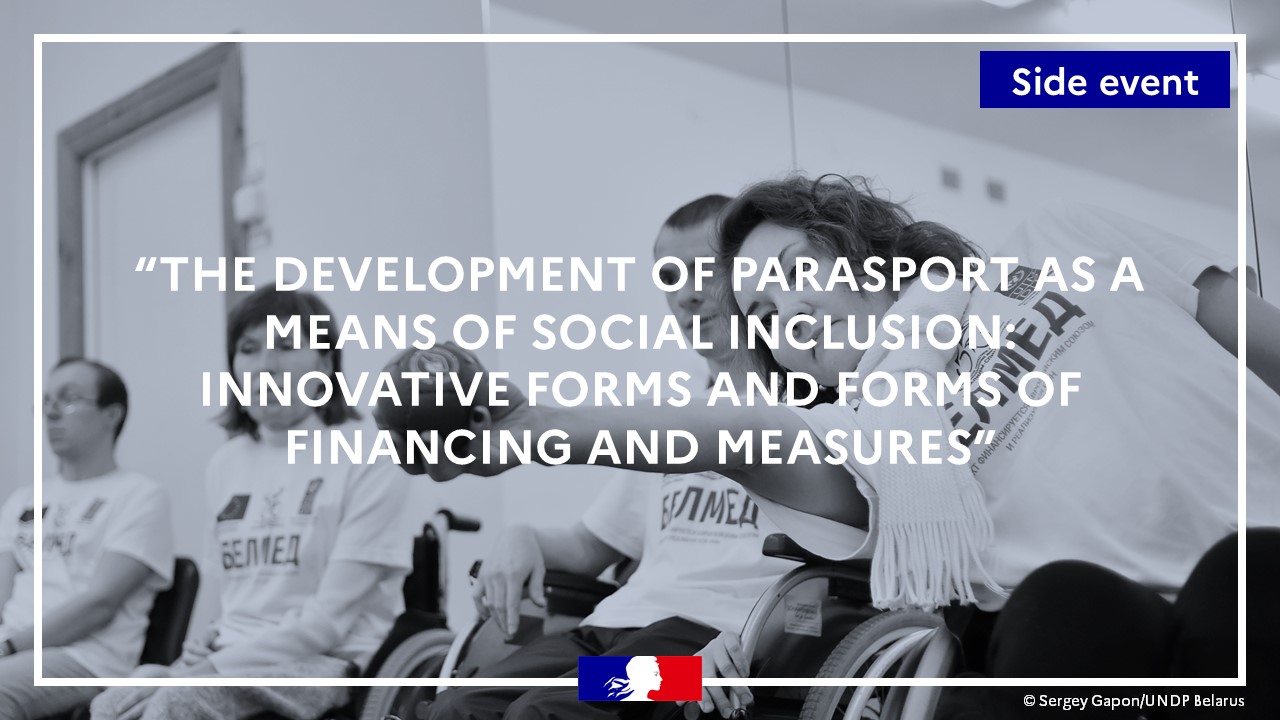Ministers,
Dear Mr. André Fufuca,
Dear Ms. Anna Paula Feminella,
Mr. National Secretary,
Ambassadors,
Representatives of associations and civil society,
Ladies and gentlemen,
Good morning everyone,
I am delighted to co-chair this side event with Brazil, to promote sport as tool for social inclusion. I would like to thank UNICEF, Special Olympics France, the French Development Agency, and Ms. Marie Rabatel for their interest in this event and for joining us here today. I would also like to thank the Permanent Representations of Brazil and France for leading the organization of this event.
We know very well that sport is an essential engine for empowering people and improving their physical ability, while also being a major lever for social cohesion.
When made accessible to all, sport becomes a space for personal development and dialogue, while contributing to better health. These dimensions are at the heart of the United Nations Convention on the Rights of Persons with Disabilities, including through its Article 30, which recognizes the right of persons with disabilities to participate equally in cultural life, leisure, and sport.
Like all citizens, people with disabilities must be able to freely choose the setting in which they participate in sports, the type of activities that interest them, with or without their peers, within an adapted structure and/or in a so-called “mainstream” club.
The people I met all shared the same observation: sport is an infinitely valuable way for people with disabilities to relate to their bodies, infinitely liberating and infinitely empowering.
Sport and health are inextricably linked, and sport for people with disabilities must contribute to improving their health. This is why the World Health Organization recommends 30 minutes of physical activity every day.
According to the national sports practices barometer in 2022, 47% of people with disabilities participate in physical or sports activities on a regular basis. This rate is up from 2018 but remains 12 points lower than the overall rate for French people over the age of 15.
Of the 12 million people with disabilities in France, more than 67,000 are licensed through two specific federations (the French Federation of Handisport and the French Federation of Adapted Sports).
The Paris 2024 Olympic Games have undoubtedly marked a turning point in the approach to sport by and for people with disabilities. Through this historic event, we collectively committed to promoting sport as an engine for overall health, or “complete well-being” as defined by the WHO.
The challenge now is to maintain the momentum and enthusiasm generated by the Paris 2024 Olympic Games, in particular by increasing the rate of participation in sport among people with disabilities.
This is also the objective of the next National Strategy for Sport and Disability, which we are preparing with the Ministry of Sports and which has been designed with all the relevant stakeholders. It aims to create the conditions that will enable these challenges to be met over the next five years.
In particular, it plans to:
![]() develop parasports by promoting, for example, sports for young people with disabilities during school, after-school, and extracurricular activities by strengthening educational partnerships involving local sports organizations.
develop parasports by promoting, for example, sports for young people with disabilities during school, after-school, and extracurricular activities by strengthening educational partnerships involving local sports organizations.
![]() This strategy also aims at improving access to parasports by removing barriers, particularly financial barriers, to participation in sports for people with disabilities, such as those related to the cost of equipment and facilities.
This strategy also aims at improving access to parasports by removing barriers, particularly financial barriers, to participation in sports for people with disabilities, such as those related to the cost of equipment and facilities.
On this last point, major progress has recently been made. In 2022, the value-added tax on specific sports equipment was reduced from 20% to 5.5%.
The reimbursement rate for sports prostheses has also been increased to 75% as part of the disability compensation benefit. Finally, thanks to the reform of wheelchair coverage by the health insurance system, sports wheelchairs will also be fully reimbursed.
With regard to equipment, the annual envelope allocated to the National Sports Agency has been increased from €2 million to €3 million in order to improve access to sports facilities, adapted vehicles, and adapted equipment.
Access to sports facilities has also been made easier with the introduction of the Pass’Sport, which offers a €50 discount on registration at a sports facility. The number of beneficiaries with disabilities has thus risen from 600 in 2023 to nearly 3,000 in 2024, a considerable increase that demonstrates the effectiveness of our public policy.
We are also taking action in the medico-social field. In 2024, an €8 million support fund was allocated to regional health agencies to finance sports projects for elderly people and people with disabilities in specialized institutions, including a program providing 30 minutes of daily physical activity for young people with disabilities.
The National Sports Agency has also allocated significant human, material, and financial resources to enable Paralympic federations, athletes, and coaches to enjoy the same benefits as their Olympic counterparts and thus perform at the highest level.
Today, this momentum continues despite persistent challenges regarding the need to build accessible infrastructure while promoting a more inclusive culture, what remains a remain major concern for the future.
The French government is preparing for another major milestone: the 2030 Winter Olympic Games, which will take place in France.
As you can see, France remains committed and will continue its long-term efforts to ensure equal access to sport for all, regardless of disability.
Thank you.
